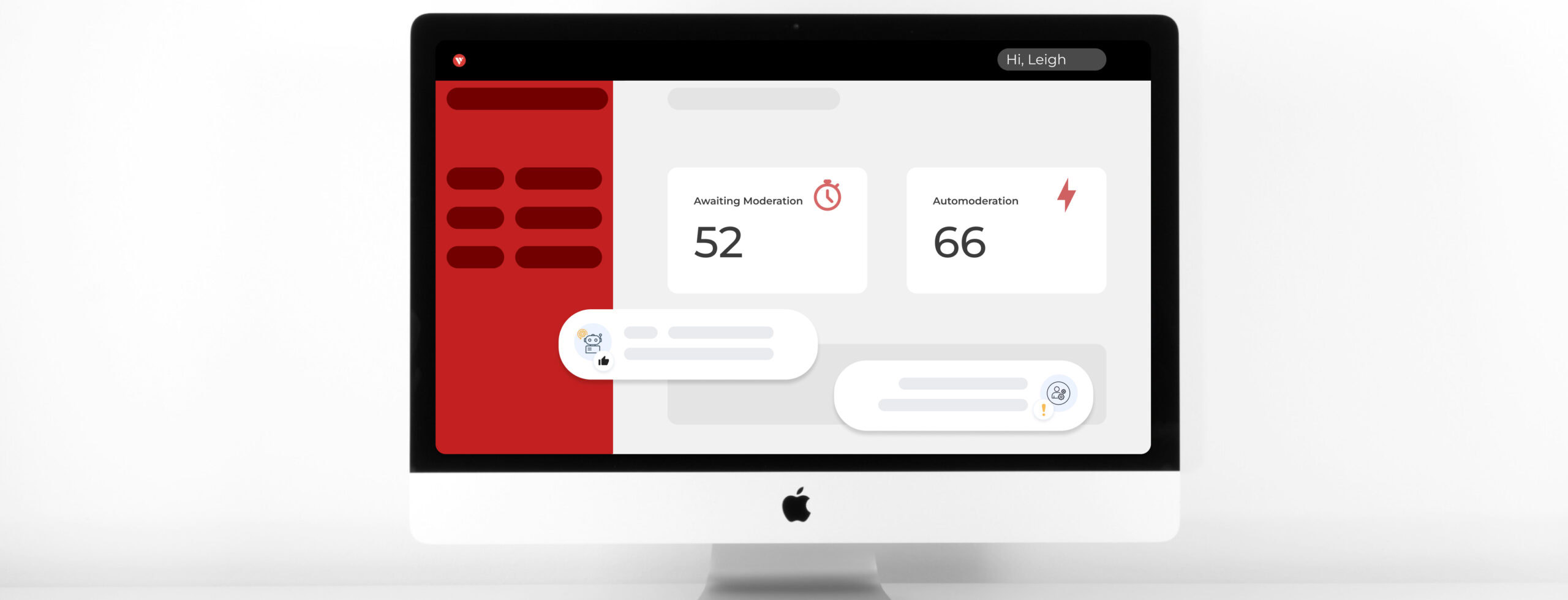Online-Gefälle überbrücken: Ein Leitfaden für Kommentar-Moderation, Internet-Etikette und mehr Höflichkeit

As a news fiend, a data enthusiast, and amateur philosopher, I spend my days pondering the future of the media industry and developing best practices to make the internet a better/safer/more inclusive place.
It’s an interesting time to say the least.
[divider line_type=“Full Width Line“ line_thickness=“3″ divider_color=“black“ divider_opacity=“90″ animate=“yes“]
Nach der Covid-Ära sind wir in fast jeder Hinsicht wieder zu normalen Standards zurückgekehrt, aber es gibt einen Bereich, in dem die Konnektivität weiter wächst: der Kommentarbereich.
- Will Trump win the next election?
- Will Caitlin Clark’s surgance in the WNBA turn a new leaf for the sport?
- Was Jeremey from Love is Blind engaged while filming for the show?
And publishers are stuck in the middle. As they strive to provide a space for their readers to engage, and exchange ideas, they are faced with increasingly divisive rhetoric, calls for free speech competing with increasing attempts to legislate online accountability.
[divider line_type=“Full Width Line“ line_thickness=“3″ divider_color=“black“ divider_opacity=“90″ animate=“yes“]
Ich habe mehr als 15 Jahre damit verbracht, in den Kommentaren zu stöbern und zu beobachten, wie die Nutzer auf Nachrichten reagieren, und in den letzten Jahren hat die Unhöflichkeit beispiellos zugenommen. Wenn ich mich mit unseren Kunden treffe, um diese Herausforderung anzugehen, schauen wir uns an, was wir mit unserer Technologie und den neuesten Funktionen lösen können, und oft sprechen wir darüber, wie sich die Nutzer verhalten sollen, ohne es wirklich auszusprechen. In den kommenden Wochen werde ich tiefer eintauchen in was Verleger tun können, aber letztendlich sind die Kommentarbereiche für die Nutzer da, und ich bin der festen Überzeugung, dass der Wandel dort beginnen muss. Die Verleger schreiben die Regeln des Engagements, die Moderatoren setzen sie durch, aber nur die Nutzer können tatsächlich eine Gemeinschaft schaffen. In den Jahren, in denen ich Gemeinschaften beim Wachsen, Streiten und Feiern beobachtet habe, habe ich gelernt, was funktioniert und was nicht, wenn es darum geht, online auf andere zu reagieren, und wie man konstruktive Kritik und Höflichkeit vorlebt.
With a small dose of mindfulness and compassion, you can help make comment sections what they are meant to be, and what the majority of readers want them to be – a place where people of all stripes and colors can engage in an open, and civilized exchange of ideas.
- Pause Before You Post: It’s easy to get caught up in the heat of the moment and fire off a hastily composed response. Take a moment to consider the tone and content of your comment. Imagine you were using your real name. Ask yourself: Is it constructive? Is it respectful? Will it contribute positively to the conversation? If the answer to any of these questions is no, then maybe it’s best left unsaid.
- Keep It Civil: Remember that behind every username is a real person with thoughts, feelings, and experiences. Avoid personal attacks, insults, and derogatory language. We all have an uncle or grandparent who might not share our views on housing affordability, or who will win the Superbowl, and yet, we manage to converse without calling them names. Disagreement is natural, but how you choose to express it is often the difference between “content enabled” and “content deactivated.” Fun fact: moderators are trained to work against bias and will not remove comments simply because they don’t like what you said – over 95% of comments that are removed for personal attacks could be approved if they were edited to follow this rule. It’s not what you say, it’s how you say it
- Stick To The Topic: Stay on topic and relevant to the discussion at hand. While everything can be connected through enough tangents, comments should remain relevant to the primary thrust of the page. Off-topic remarks can derail conversations and lead to confusion and frustration for other participants. Fun fact #2: Comments about moderation are almost always off-topic
- Fact-Check Before You Share: Publishers are increasingly cracking down on mis/disinformation that can spread like wildfire in commenting sections. Misleading or false information can stoke the flames, and contribute to confusion and misunderstandings. Take the time to fact-check your sources and provide evidence to support your claims beyond the original source. You can check out Google’s fact checking tools and tips here.
- Fight Fair: If someone offers constructive criticism or differing viewpoints, repeat step 1. Before responding, try to understand where they might be coming from, to approach it with an open mind. Engage in thoughtful discussion and be willing to reconsider your own perspectives. Remember, it’s okay to agree to disagree respectfully. And admitting you are wrong can go a long way to bridging divides.
- Don’t Feed the Trolls, Report Them: When you (inevitably) encounter users who do not play by these principles, it can be tempting to jump in and point out their missteps, tell them how wrong they are, or correct their misinformation. However, the most productive thing you can do is to not further escalate the conflict, but use flagging or reporting tools available on-site to let moderators know so they can take action. But be careful! Reporting content that doesn’t violate guidelines may land you in the hot seat.